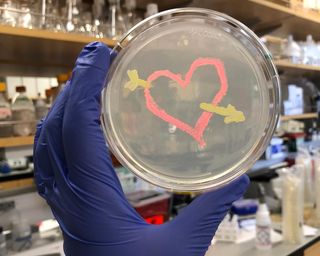Genetics
Microbes and the Mind
Microbes exert a surprising amount of control over our mind.
Posted July 9, 2019
You are not a singleton. No matter how well you think you know yourself – even if you sent your saliva to 23andMe – you are only skimming the surface. Your human genes represent only 1 percent of your total genome. You are, genetically speaking, almost entirely microbial. And, since genes produce all the useful proteins and enzymes that run the show, your cravings, your moods, even your personality, can be affected by those tiny creatures. You are plural.
Microbes turn out to be promiscuous, happily accepting genes from other species, other genera, and even other kingdoms of life. When you take antibiotics, a microbe may sense its impending doom and borrow an antibiotic-resistance gene from a passing virus. Accepting and gifting genes is not a trifling change to a creature that only has a few hundred genes to begin with. It can grant superpowers to a microbe, allowing it to conquer new territory and banish new foes.
Whereas humans may take millennia to change a gene, a microbe can spawn a new generation of genetically pumped-up sister cells in 20 minutes or so. The upshot is that microbes run evolutionary circles around us. With our ancient, baked-in defenses, we are sitting ducks for the swiftly mutating microbes of the world. And so, sometime in our dim primordial past, we recruited beneficial bacteria to protect us from the nasty ones. In return for a wet and warm environment with a continuous buffet, microbes protect us by fighting and out-competing pathogens. That relationship has allowed animals to thrive in a world teeming with pathogens.
How important is this symbiosis? Important enough that all animals go to great lengths to pass selected microbes on to their children. Many animals, from horses to geese, consume their parent's microbe-laden poop as soon as they are born. In humans, the birth canal provides an early anointment of microbes. Birth can be messy and babies may pick up some of mom's poop as well. Perhaps most surprising, mother's milk contains bacteria that further establish the baby's starter gut microbes. Breast milk even contains prebiotic sugars produced specifically to feed those microbes.
But the adoption of a microbial shield doesn't come without consequences. Our gut microbes, collectively called the microbiota, have their own needs – and they know how to fill them. Astonishingly, microbes can produce human neurotransmitters, including dopamine and serotonin, two of the most popular targets of antidepressant medications. Microbes can also produce hormones and fatty acids, all of which can be potent mood manipulators. Couple that with bacterial toxins, and microbes have a surprising carrot-and-stick level of control over their human landlords. Do you think that you made a conscious decision to love Cheetos? It is possible that your microbes are the real Cheetos seekers, and your cravings have been molded to suit their desire.
Are you a chicken-hearted personality or a brave chest-thumper? That too may be affected by your microbiota. Germ-free mice, which are born via antiseptic C-section and reared in a sterile environment, are the go-to animals for microbe studies. What better way to analyze the effect of microbes than to start with an animal that has none? These mice react to the vicissitudes of life differently than their normal, germy brethren. They tend to spend less time socializing with other mice – almost as if they understand the danger of living without protective bacteria. Their brains develop differently, with unusual wiring and impaired memory. They are more in the chicken-hearted category, with an exaggerated response to stress. These germ-free mouse studies from the early 2000s provided some of the first indications that behavior can be modified by microbes. It was an eye-opener.

These studies made it clear that lacking microbes was actually unhealthy. The germ theory of disease suddenly looked threadbare. Microbes, it seemed, could be good for you – and for your mood. Those good-mood microbes are called psychobiotic, a term coined by psychiatrist Ted Dinan and neurology professor John Cryan at University College Cork in 2013. Psychobiotics are starting to change the face of psychiatry, and Dinan is successfully using them in his practice to treat patients who are averse to typical psychoactive drugs. The leverage psychobiotics exert over our mood is a sobering illustration of microbial power.
As well as fighting off pathogens, our microbiota also helps to keep your gut lining in the pink of health. The gut has the tricky job of letting nutrients in while keeping microbes out. There is a lot of wear and tear in your gut, and it needs to constantly renew itself. Some of the beneficial bacteria in your gut are quite helpful in this regard. When you feed them fibrous food, they produce substances like butyrate which are manna for the cells lining your gut. Butyrate both nourishes and heals the gut lining, helping to keep your microbes in your colon where they belong.
When bacteria break through the gut lining and invade the bloodstream, your heart obligingly pumps them to every organ in your body. That can cause infections in many tissues, sparking inflammation. Left to simmer, that inflammation can give rise to a host of diseases, including heart disease, diabetes, Parkinson's, Alzheimer's, obesity, depression and more. In fact, it is slowly dawning on researchers that almost all chronic diseases seem to start in the gut. The dramatic rise in such diseases is tied to our microbiota, and we have only ourselves to blame. Our fast-food culture has eliminated fiber from our diet in favor of delicious fats and sugars. The point is to make beautiful white bread and soft, fluffy cakes. But fiber is necessary to balance our microbiota and when you starve your microbes you kick off a series of events that can lead to sickness.
This is just the beginning of the story. If microbes can guide our behavior, what else might they be up to? Think about it from the microbe's point of view. In order to expand their territory, they may drive us to socialize more. From a microbial perspective, what could be a better route of transmission than kisses, handshakes or hugs? Do our microbes drive these behaviors? It sounds ridiculous, but invisible germs causing disease also sounded pretty laughable at one time. If you want to know who's in the driver's seat today, just look to your gut. The microbial metropolis in your colon controls the bulk of your genetic machinery. It's probably time to treat it better.




